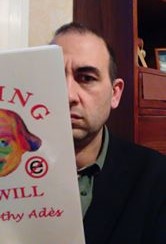This is the House that Jack Built
Anon
Spanish words by Timothy Adès
This is the House that Jack Built
This is the house that Jack built.
This is the malt
That lay in the house that Jack built.
This is the rat,
That ate the malt
That lay in the house that Jack built.
This is the cat,
That killed the rat,
That ate the malt
That lay in the house that Jack built.
This is the dog,
That worried the cat,
That killed the rat,
That ate the malt
That lay in the house that Jack built.
This is the cow with the crumpled horn,
That tossed the dog,
That worried the cat,
That killed the rat,
That ate the malt
That lay in the house that Jack built.
This is the maiden all forlorn,
That milked the cow with the crumpled horn,
That tossed the dog,
That worried the cat,
That killed the rat,
That ate the malt
That lay in the house that Jack built.
This is the man all tattered and torn,
That kissed the maiden all forlorn,
That milked the cow with the crumpled horn,
That tossed the dog,
That worried the cat,
That killed the rat,
That ate the malt
That lay in the house that Jack built.
This is the priest all shaven and shorn,
That married the man all tattered and torn,
That kissed the maiden all forlorn,
That milked the cow with the crumpled horn,
That tossed the dog,
That worried the cat,
That killed the rat,
That ate the malt
That lay in the house that Jack built.
This is the cock that crowed in the morn,
That waked the priest all shaven and shorn,
That married the man all tattered and torn,
That kissed the maiden all forlorn,
That milked the cow with the crumpled horn,
That tossed the dog,
That worried the cat,
That killed the rat,
That ate the malt
That lay in the house that Jack built.
This is the farmer sowing the corn,
That kept the cock that crowed in the morn.
That waked the priest all shaven and shorn,
That married the man all tattered and torn,
That kissed the maiden all forlorn,
That milked the cow with the crumpled horn,
That tossed the dog,
That worried the cat,
That killed the rat,
That ate the malt
That lay in the house that Jack built.La casita que hizo Conchita
Esta casita la hizo Conchita.
Esta es la malta surtida en la dicha
casita que hizo Conchita.
Esta es la atroz ratoncita
que almuerza la malta surtida en la dicha
casita que hizo Conchita.
Esta es la gata
que mata a la atroz ratoncita
que almuerza la malta surtida en la dicha
casita que hizo Conchita.
Esta es la perra
que pica a la gata
que mata a la atroz ratoncita
que almuerza la malta surtida en la dicha
casita que hizo Conchita.
Esta es la vaca con cuerna chafada
que lanza a la perra
que pica a la gata
que mata a la atroz ratoncita
que almuerza la malta surtida en la dicha
casita que hizo Conchita.
Esta es la chica funesta
lechera a la vaca con cuerna chafada
que lanza a la perra
que pica a la gata
que mata a la atroz ratoncita
que almuerza la malta surtida en la dicha
casita que hizo Conchita.
Este es el hombre rasgado
quien besa a la chica funesta
lechera a la vaca con cuerna chafada
que lanza a la perra
que pica a la gata
que mata la atroz ratoncita
que almuerza la malta surtida en la dicha
casita que hizo Conchita.
Este es el cura rapado
quien casa a aquel hombre rasgado
quien besa a la chica funesta
lechera a la vaca con cuerna chafada
que lanza a la perra
que pica a la gata
que mata a la atroz ratoncita
que almuerza la malta surtida en la dicha
casita que hizo Conchita.
Este es el gallo que canta temprano,
despierta a aquel cura rapado
quien casa a aquel hombre rasgado
quien besa a la chica funesta
lechera a la vaca con cuerna chafada
que lanza a la perra
que pica a la gata
que mata a la atroz ratoncita
que almuerza la malta surtida en la dicha
casita que hizo Conchita.
Hay un granjero quien siembra buen grano
quien cuida aquel gallo que canta temprano,
despierta a aquel cura rapado
quien casa a aquel hombre rasgado
quien besa a la chica funesta
lechera a la vaca con cuerna chafada
que lanza a la perra
que pica a la gata
que mata a la atroz ratoncita
que almuerza la malta surtida en la dicha
casita que hizo Conchita.A popular English nursery rhyme, more background on Wikipedia
Translation: Copyright © Timothy Adès
